WASHINGTON, D.C. - Ways and Means Committee Chairman Charles B. Rangel issued the following opening remarks during today’s full Committee hearing on trade policy with the United States Trade Representative Susan Schwab:
“Good morning Ambassador Schwab. We are very pleased you have weathered the storm to appear before the panel today. I want to be your new best friend because, together, we can share with the American people and with the Congress how important trade is to the United States and how it can lead to broad based growth here and abroad.
“Unfortunately, the recent thinking on trade policy has been polarized. It has been my limited experience that the Chamber of Commerce has never seen a trade agreement they didn’t like, and labor hasn’t seen one they did like. Trade gets such a bad name because there is a perception that negotiations only concern the multi-national corporations, while the victims of globalization believe they’re denied the attention they deserve. We don’t hear people walking the streets saying ‘I got my job through NAFTA or CAFTA’, we hear from the people who lost their jobs as a result of trade agreements.
“I am very pleased by your leadership and the Administration’s intent to demonstrate to the American people that yes, there is pain with progress, but our country isn’t just concerned with agreements for the businesses who are already winning. We need to show that we are also concerned about businesses and workers that are having a hard time and that we are working together to help all American workers, farmers and businesses maintain a competitive edge and benefit from trade.
“We are working on language that will not do damage to American trade agreements, but that would show that this great country is concerned with at least minimum standards on critical issues such as labor and the environment. I’d like to say, that - while we’re not there yet - Mr. Levin and I are very pleased by your willingness to work with us and with Mr. McCrery to remove any impediments and make certain that agreements before this committee will be considered in a very bipartisan way."








